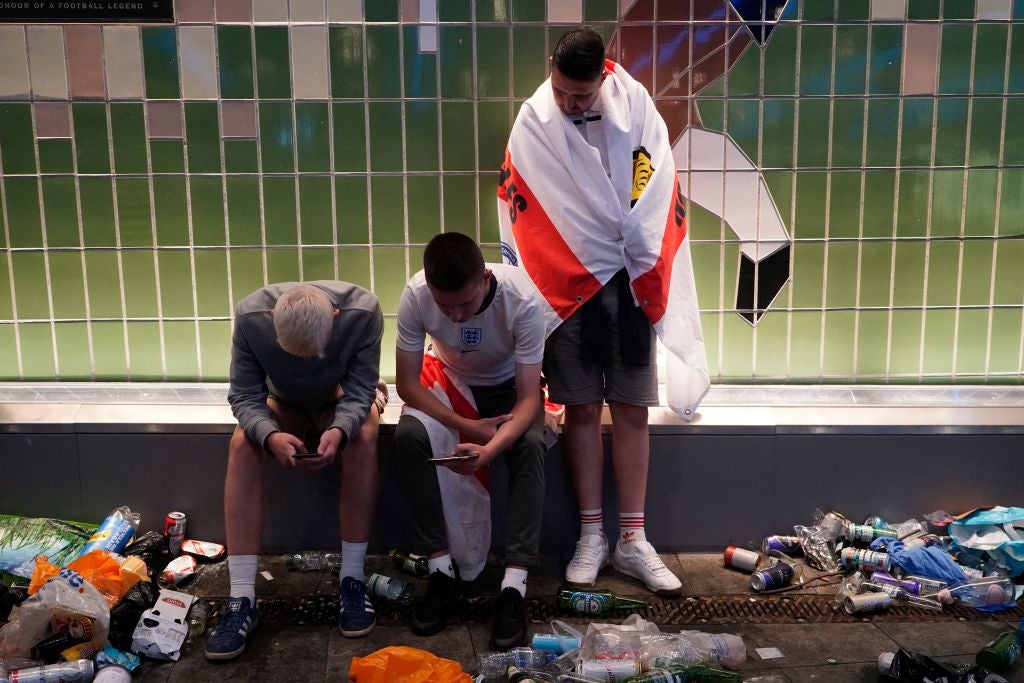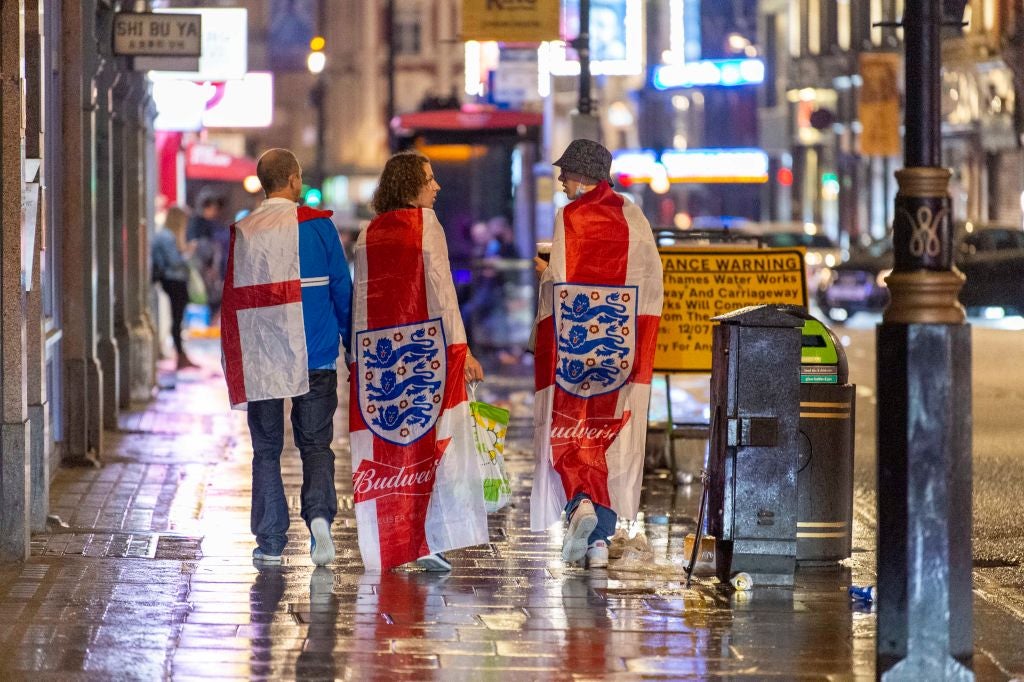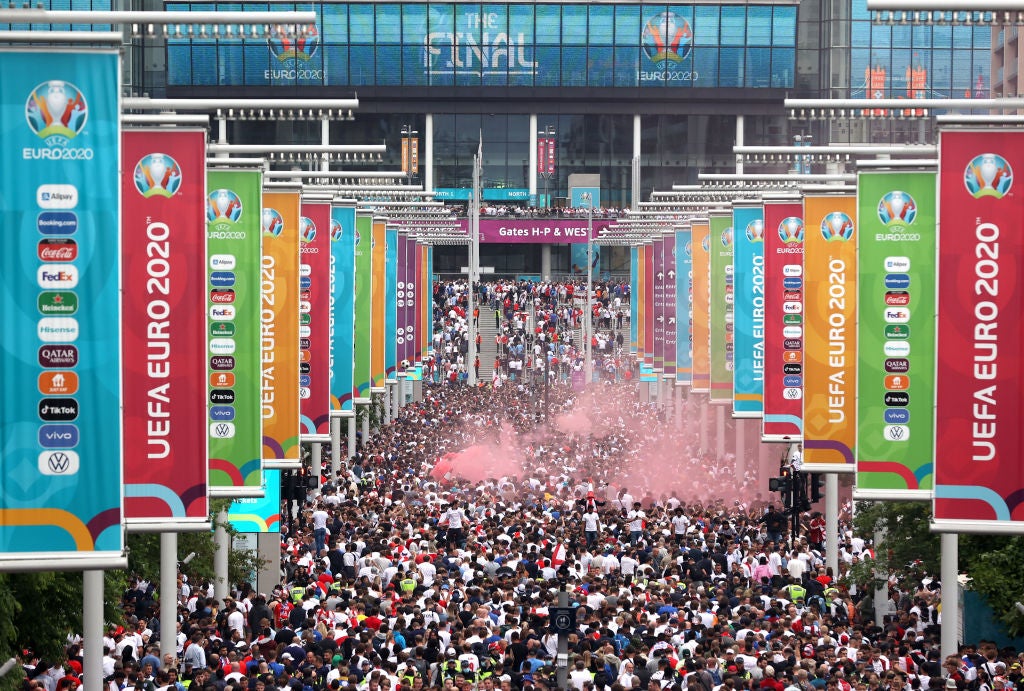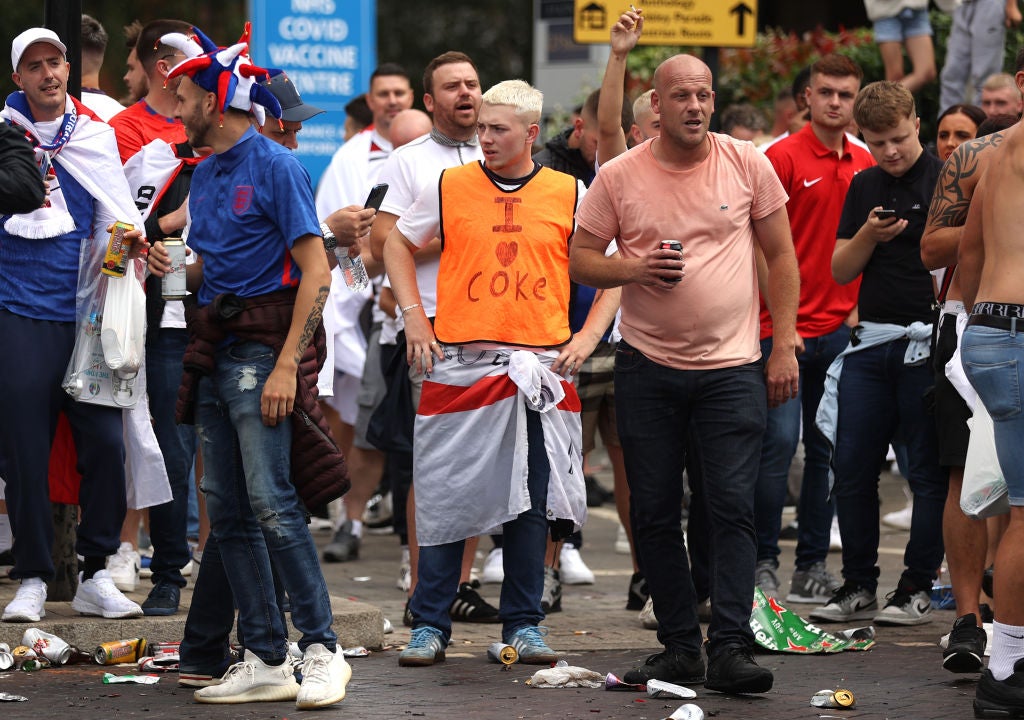Ugly Wembley fallout leaves questions to answer for police, Uefa and the FA
Crowd trouble pre-game and wild scenes around the capital took the shine off a night the nation had waited half a century for

Your support helps us to tell the story
From reproductive rights to climate change to Big Tech, The Independent is on the ground when the story is developing. Whether it's investigating the financials of Elon Musk's pro-Trump PAC or producing our latest documentary, 'The A Word', which shines a light on the American women fighting for reproductive rights, we know how important it is to parse out the facts from the messaging.
At such a critical moment in US history, we need reporters on the ground. Your donation allows us to keep sending journalists to speak to both sides of the story.
The Independent is trusted by Americans across the entire political spectrum. And unlike many other quality news outlets, we choose not to lock Americans out of our reporting and analysis with paywalls. We believe quality journalism should be available to everyone, paid for by those who can afford it.
Your support makes all the difference.Maybe it was the sight of a fan in a wheelchair having his lanyard ripped off. Maybe it was the sound of outright racist and xenophobic abuse, that are usually the cause for immediate removal from any English stadium. Maybe it was the poor young steward punched at Wembley Way. Maybe it was the openness of cocaine use in front of young kids.
It was difficult to pick a worst moment around Wembley on Sunday but, either way, all were much more depressing than anything that happened on the pitch.
Several England supporters who legitimately attended the Euro 2020 final have come forward to tell the Independent that they long ceased to care about the game, because they were so worried about everything going on around them. One family said they left after half an hour because their children were petrified.
“Sunday was a complete disgrace,” James, a long-time member of England’s supporters travel club, says. “People in the club are genuinely upset and disgusted by how something we’ve looked forward to for years has been ruined.”
The most concerning element was that there was nothing stopping any of it whatsoever.
If there is still so much hope about this young England team, there can only be despair about some of the English football culture that unfortunately surrounds them.
The audible racist abuse illustrates it is connected to the abuse players received on social media, and emphasises the sad disconnect between what this squad are and what a lot of English football is.
The brutal truth is this. It should have been a privilege to be at Wembley on Sunday for a great occasion. It was instead a sordid and tacky affair, overtaken by the worst type of football supporter. They ruined the day for the majority of well-behaved well-meaning England fans more than the result ever could. It was depressing from top to bottom, the ground on Wembley Way sticky with stale booze from 2pm, the air filtered through abuse, cocaine and wonder knows how much Covid-19 transmission.
English football’s biggest day in 55 years ended up a chaotic and violent shambles, that may well cost the country the 2030 World Cup. That will be an embarrassment for Boris Johnson’s government given that was what so much of this was about, not to mention to public relations value, but there are far more pressing concerns regarding the organisation and logistics. The sole positive is that it could have very easily been a lot worse, and only fortune prevented that.
“It should have been a celebration of football and the country coming together but instead it just felt dangerously disorganised and that people were there for the wrong reasons,” says James, who declines to give his surname for understandable reasons. “I’ve barely missed a game for 10 years and it’s the worst organisation I’ve seen at a major tournament. Really sad that that’s getting the headlines but genuinely feel like it could’ve been miles worse.”
Uefa are undertaking their usual post-tournament report, but many sources now expect that to form the basis of a disciplinary case and potential charge against the Football Association (FA). There is already a lot of finger-pointing and blame-shifting behind the scenes.
The way these events work is that Uefa is the match and competition organiser, the local football federation is responsible for what happens inside the stadium and the local authorities – in this case the Metropolitan Police, and ultimately the Home Office – are responsible for what happens outside in the streets around the stadium.

One involved figure described it as “a public order offence that then went inside the stadium”. Responsibility goes very high. Given how central the government have made themselves to the successful operation of prior games in this tournament, there are a number of questions to be asked. Did the home secretary Priti Patel approve the operations? Did she attend the meetings? Did she sign it off? Who does she blame for letting ticketless fans get to the perimeter of the stadium?
The Independent has put these questions to the government, and is awaiting comment. The Met have confirmed that there were 53 arrests in a statement, and that there was an element of being caught out. That is an understatement.
On the night, many seasoned journalists and football sources were saying the event was the worst in Europe since the 2007 Champions League in Athens, where many supporters got in without tickets, and far more chaotic than the 2018 Copa Libertadores final in Buenos Aires – a game that was actually called off through crowd disorder.
There was much tighter security at that, and about four rings of steel. It was the same at the equivalent fixture at the last European Championships in Paris, where the Stade de France did resemble a "fortress" – to use FA chief executive Mark Bullingham's word.
There was none of that at Wembley.
This is where the problems started.
It was first of all so easy for people to get to the stadium. There were estimates of 250,000 people flocking to the ground, where there was only one perimeter fence separating the stadium from the surrounding area.

That area now poses a problem for such events. It is far too built up with apartments and shops, as if they have almost forgotten there is supposed to be an elite stadium in the middle of it. There is very little space to move, which created a huge bottleneck at Wembley Way from the early afternoon. The stadium may be becoming unfit for purpose in this regard, at least for events that require this level of security.
Many of the fans the Independent have spoken to for this piece had the same descriptions for that scene. “Bedlam.” “Carnage.” “A complete free for all.”
The second you stepped onto Wembley Way there were scenes of extreme drunkenness, open cocaine abuse and outright belligerence. One supporter tells of a woman in an England shirt describing him as “a traitor” for letting an Italian fan put something in a bin. “I heard so much xenophobia,” another fan who declines to be named says. “It was just a horrible, scummy experience.”
Again, there was nothing to stop any of this. “It was like they’d forgotten how to police these events."
“It was so poorly planned,” Phil Clarke, a long-time England away fan, explains. “The lack of policing on Wembley Way was so stark. If you take a Millwall game at Leeds United as an example, there are dog handlers everywhere and probably one copper for every two or three fans. On Sunday, they were invisible around the perimeter.
“I think back to the semi-final in Russia. The ring around the ground was a) much further from the stadium, b) impenetrable and c) the police and stewards were not to be messed with.”
This certainly wasn’t the case once you got to the Wembley perimeter.
Underpaid and under-prepared stewards - through no fault of their own - were faced with a crowd they couldn’t possibly begin to handle. They were left in an impossible situation and one that was about to get a lot worse.
Numerous fans have said that word had got around that these games were easy to “jib” into without tickets. Supporters reported “zero police presence” for the games against Denmark and Germany.
“Don’t underestimate how many will have been drawn to the stadium in the hope of getting a ticket,” one source at a Premier League club says. “The touting scene has its heart in London, and Wembley is renowned for being one of the easiest bunks going. It’s low risk, high reward, especially for an occasion like this.
What happened here, with the lack of security, was a very high number of fans getting in without tickets.
Again, for games of this magnitude – and even run-of-the-mill domestic games – there are usually multiple layers of security. Not at Wembley.

“It was just carnage,” Clarke says. “Everyone was pushing forwards into a little funnel system with kids as stewards trying to maintain order. Why were there no police there keeping people back until there was space for the next group?”
It was simply inexplicable, but all the more so given the context.
Attending supporters were supposed to show proof of either double vaccination or a negative Covid test. Many just ran past or smashed through the gates. Some used screenshots of others’ Covid passes.
“These are quite obviously serious breaches of protocol,” Clarke adds. It may well create a series of problems to come regarding the Covid situation.
Once in, the scenes got really ugly.
Many videos have already done the rounds on social media of fights in the concourse. Even around the press box, fans who clearly didn’t have tickets could be seen taking standing positions or just trying to claim a place between seats.
This naturally led to those who legitimately had tickets asking questions, and getting aggravated. The atmosphere turned nastier. Fights started breaking out. Fans who tried to get into seats they’d paid for were told to “f**k off” or called “grasses” or “snakes”. Those who didn’t kick up a fuss were forced to stand in aisles. Supporters complained to stewards, who just didn’t have the manpower to do anything, leading to the same supporters coming up to the press box and pleading for journalists to report “the chaos” in the concourse or to just call the police.
It was getting that bad. It was getting even worse in terms of what was said.
Several fans who spoke to the Independent reported hearing outright xenophobic and racist abuse - towards Italian fans and just generally.

It is impossible not to link this to the racist abuse the players received on social media, and the booing of taking the knee.
You couldn’t have a more fittingly unsavoury bookend for the controversy that kicked off the tournament, and shows how the national game articulates the divide in the country as much as it offers the potential for unity. The unfortunate reality is that Gareth Southgate's progressive team reflect something very different, and much more progressive, than many of the fans they are supposed to represent. The images of both couldn't be more different.
Because, for all the problems with the policing and the logistics, there shouldn’t be absolution for those responsible for the carnage itself.
The entire episode points to wider issues in British society, and football’s place in that. Rather than a national event that should have had a carnival atmosphere, it was something much more unsavoury. Rather than a release of emotion, it was seemingly a release from all inhibitions. The queues outside pubs at 8am, for an 8pm kick-off, are testament to that, tapping into something deeper in the British psyche. It was just an excuse to go all out. Many said it was like Dortmund, Guimaraes, Seville and so many other problematic modern England away fixtures finally coming home. But multiply that by a thousand. A series of supporters said this was why they didn’t go to England games for so long, and this is why they won’t return any time soon.
“It felt very reminiscent of a few England away trips I’ve been on – Amsterdam being one – where lots of quite young blokes turn up, thinking it’ll be carnage and it’s all about kicking off and smashing up cities,” James says. “Then they get there and it isn’t happening so they start it as they think ‘this is what England fans do’. Just really deflating. I genuinely hope we don’t get the 2030 World Cup now, which is a shame as the UK has also been a good host for this [and] for other games. You only have to look at the other semi-final, between Spain and Italy.
“I honestly found it hard to be too gutted about the match because of it.”
The day had been depressing enough, in so many other senses.
It was only a score of football’s problems that came home.
Join our commenting forum
Join thought-provoking conversations, follow other Independent readers and see their replies
Comments